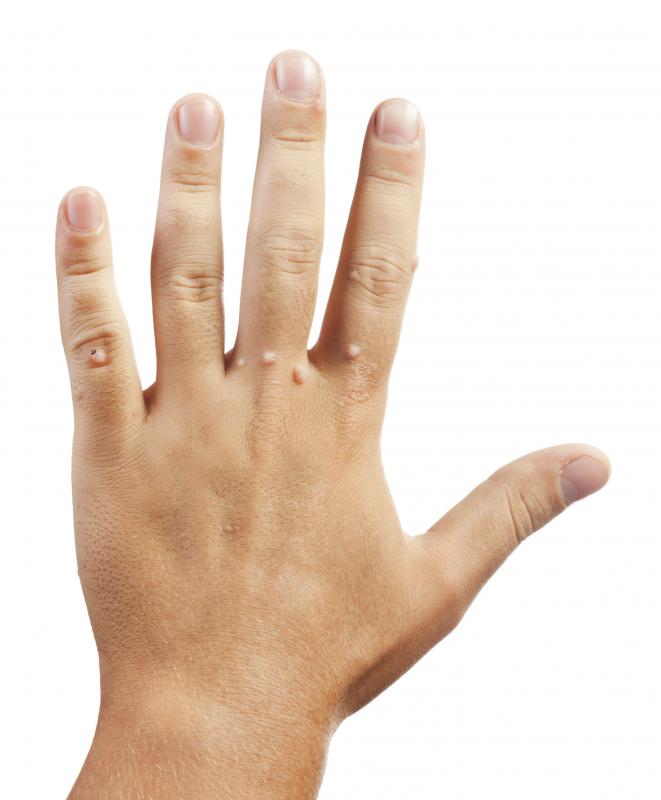At PracticalAdultInsights, we're committed to delivering accurate, trustworthy information. Our expert-authored content is rigorously fact-checked and sourced from credible authorities. Discover how we uphold the highest standards in providing you with reliable knowledge.
What Does a Theater Makeup Artist Do?
A theater makeup artist is responsible for helping actors stand out onstage or, in some cases, on film. This can include amplifying the actor's natural features through the creative use of makeup techniques. It can also include creating characters though cosmetics, such as making wrinkles or adding features like moles, warts, or wounds. Many theater schools and programs offer courses in makeup artistry. A theater makeup artist is important to a company or production because he or she helps build the illusion that the actors are working to portray.
Often, a theater makeup artist trains for several years before beginning to work professionally. Thereafter, he or she spends another few years gaining experience as an assistant or in small companies. Local productions sometimes use amateur artists, but a professional can work in settings such as Broadway or Hollywood.

A successful theater makeup artist is able to understand the look and feel of a character and to use cosmetics and techniques to help a performer more closely resemble the role. He or she must also understand how the onstage or on-camera lighting affects the planes and shadows of an actor's face and form. While most of the artist's work is centered on an actor's face, he or she might also work with other exposed areas of the body such as the hands or neck.

Creating a theatrical makeup look is much different than creating a look for fashion or everyday life. Features must often be overemphasized because of lighting and the distance between the audience and the performers. A theater makeup artist's work usually looks completely unrealistic close up but works well onstage.
In some cases, a theater makeup artist may focus on a specialty such as airbrushing. An airbrush artist uses special air-driven applicators rather than the brushes and sponges more commonly used to apply cosmetics. Some artists prefer airbrushing because it is thought to provide smoother, more even coverage. Others argue, however, that deep coloration is harder to achieve with an airbrush.

Special effects makeup is a distinct area of theater makeup artistry. It involves the creation of extreme looks, such as monsters, aliens, murder victims, and more. Often, this type of makeup requires the manufacture of prosthetic devices such as ears, chins, or scars. During a long theater run or during the filming of a movie, the makeup artist must be careful to apply the prostheses and makeup in the same way each day to ensure consistency.
AS FEATURED ON:
AS FEATURED ON:














Discussion Comments
@Mor - The problem with that is that I'm not sure the average person working in a salon would know what to do with theater makeup. They might not always use greasepaint like they used to, but it's still fairly specialized, because you've got to be able to work to the conditions.
The makeup has to be able to last under very hot lights and over a fairly long period of time, as well as possibly being changed halfway through the production, depending on what happens to the character.
As well as that it's got to stand out to the people at the back without looking ridiculous to the people in the front, and it's got to do this under a variety of different lights.
There's definitely a reason that they give courses specifically for theater makeup. It's a very specialized area and even a person who works with makeup all the time might not have the skills needed to do it well.
@pastanaga - It depends on what kind of show you're doing. If it's something that has specialized makeup they probably won't expect the actors to do it.
And in my experience a lot of smaller shows, where most of the people working on it are basically volunteering, will manage to get a local salon or something to sponsor them by providing the makeup and get advertising in return. That way they get extra practice at something fun and the show gets professional makeup.
I've heard that a lot of the time you pretty much need to know a lot about makeup to just be an actor in theater, because many actors start out doing their own makeup before they make the big time.
And, of course, being able to make yourself look good and memorable might help to get you to the big time.
So I would suggest that taking a course on makeup is worthwhile for anyone who wants to act, just in case you end up needing those skills at some point.
Post your comments